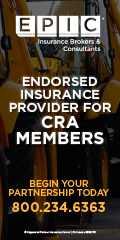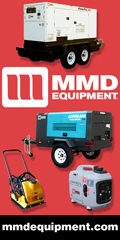
| Past Issues/Subscribe | Advertise |
CIAQC Submits Comment Letter to ARB
Michael Lewis, of the CIAQC (Construction Industry Air Quality Coalition), recently submitted a letter to the California Air Resources Board (ARB) concerning the proposed amendments to the Statewide Portable Engines Registration Program Regulations (PERP) and Airborne Toxic Control Measure for Diesel Particulate Matter (ATCM). "On behalf of the Construction Industry Air Quality Coalition (CIAQC) we would like to submit the following comments in response to the ideas and draft orders presented by the California Air Resources Board (CARB) staff at the Public workshop held on June 30, 2016. "By way of historic reference, we would point out the CIAQC was the sponsor of the original authorizing legislation in 1996 that created the framework for a statewide portable equipment registration program. This grew out of the industry’s frustration with the myriad of regulations and permit requirements that had been implemented by the air districts in California and made it difficult if not impossible for construction companies to freely move equipment around the state. "As full participants in your working group meetings, we are generally pleased with the direction that the proposed modifications are taking but we have a number of questions that need to be addressed. We would like to remind CARB that the enabling statute calls for 'A uniform, voluntary system of statewide registration and regulation of portable equipment....to ensure consistent and reasonable regulation of that equipment without undue burden on their owners, operators and manufacturers.' "In addition, the Health and Safety Code also states that, 'It is the intent of the Legislature that the registration of, and the regulation of emissions from, portable equipment that is operated in more than one district and that is subject to the registration program be done on a uniform, statewide basis by the state board and that the permitting, registration and regulation of portable equipment by the districts be preempted.'
"We would like to remind CARB that the enabling statute calls for 'A uniform, voluntary system of statewide registration and regulation of portable equipment....to ensure consistent and reasonable regulation of that equipment without undue burden on their owners, operators and manufacturers.' In addition, the Health and Safety Code also states that, 'It is the intent of the Legislature that the registration of, and the regulation of emissions from, portable equipment that is operated in more than one district and that is subject to the registration program be done on a uniform, statewide basis by the state board and that the permitting, registration and regulation of portable equipment by the districts be preempted.' "The fleet average milestones proposed in 2020, 2023 and 2027 are still too aggressive. As I mentioned at the workshop, it almost appears you are setting these at unrealistic levels that would intend on pushing everybody towards the Tier level phase out option. You heard from many in the room that they would not even be able to meet the proposed 0.10 g/bhp-hr 2020 average with their fleets being heavily weighted with very large Tier 2 engines > 750 with a PM value of 0.12 g/bhp-hr. You also heard the Tier 4 Final 'replacements' for these engines are not even available because much of this equipment is still offered using Tier 2 flexibility engines.
"Tier 4 Final engines in the > 750 HP range, with a PM standard of 0.03 g/bhp-hr, would be the only engines that could work in achieving the 0.03 g/bhp-hr final 2027 milestone you have proposed, so you would really be forcing all of this very expensive equipment to be replaced with Tier 4 Final engines by 2020 if the fleet average was chosen. With this equipment not even available, you are essentially giving them no alternatives. As a suggestion, PM levels of 0.12, 0.09 and 0.06 g/bhp-hr for 2020, 2023 and 2027 respectively may be more appropriate. Your draft language would require a large fleet to chose either an engine phase out or fleet average approach by 6/30/2019. Once that determination is made, you would not allow a fleet to change course. Several at the workshop asked for the flexibility to potentially change their compliance approach between 2019 and 2028. It seems you could pick a reporting period (e.g. June each year) where a fleet could re-opt their position, providing that at the time they select the new course, they would already be compliant with that option. We would be in agreement with this flexibility. "On the concern of uniformity of operation, CIAQC raises the issue for restrictions that may be imposed on engines in SCAQMD and SJVAPCD. While the requirements for a uniform statewide program identified in Health & Safety Code Sections 41750 - 71755 essentially pertains to PERP, indirectly such a restriction in the ATCM would still restrict PERP equipment in a manner that would not be consistent with the H&SC. We recognize your proposal would only affect fleets using the fleet average, and would only affect engines that were banned in the phase out approach. However, we believe this added complexity of a district by district restriction will only cause more difficulty in enforcement. "Your draft would eliminate the multiple engine discount. CIAQC has not had time to poll its members to see how this may be applied and to what benefit. We would ask CARB to share the numbers on how many companies use this option, and how much is saved by those companies in using that option. In lieu of the multiple engine discount, it was suggested that perhaps the initial fee be eliminated because all engines are now Tier 4 Final. "At the workshop CARB stated they wanted both a sales prohibition that would prohibit sales of banned engines to end users in California as well as a sales disclosure requirement similar to the on-road and off-road regulation disclosures. We did not see the proposed sales disclosure in the draft language, but Bob Shepherd has shared what had been proposed to you that would provide a generic disclosure that could be used for compliance with the on-road, off-road and portable regulations. If such a disclosure is necessary, we would agree it should be universal to any of the regulations requiring such disclosure. We do want to ensure sellers are not caught up in enforcement by local air districts with sales made to brokers, auction houses, national companies where the engine may ultimately end up illegally back in California. CARB staff insisted if the disclosure was made, the seller would not be held responsible. We need that assurance. "We are concerned about the Tier 4 final engines and the integration of them into the statewide fleet. The current proposal calls for a significant reduction in the useful life of the earlier Tier engines in order to 'force' their replacement with Tier 4 engines. The industry is also aware that CARB is pushing for a new on-road standard that will likely require a Tier 5 engine. The prospect that an even newer engine will appear and require new investments to achieve a yet undetermined future fleet average will have the unintended consequence of causing slower fleet turnover rather than accelerating fleet turnover. Some incentive will have to be provided if early acquisition of Tier 4 engines is to be expected from this regulation. The prospect of a shortened 'useful life' for Tier 4 needs to be addressed. Finally, we would request that at least one more working group meeting be convened in order to discuss these issues before a revised proposal is submitted for public review and comment." |

| calrental.org |



